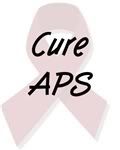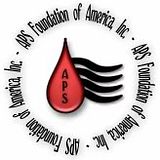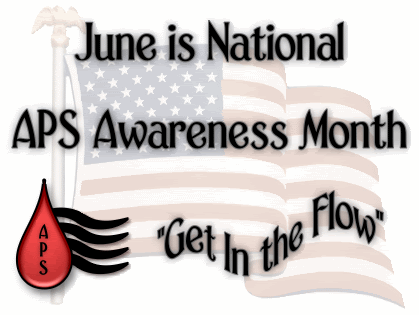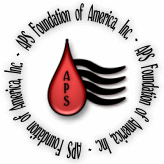07/23/2007
Sisters' ailment identified
By Christy Murdoch , For the Herald-Standard
Sisters Darla Pardo and Robin L. Gibson display a variety of medications. After suffering symptoms for years, the two have been diagnosed with the blood-clotting disorder Antiphospholipid Antibody Syndrome.
After years of suffering from mysterious health problems, Robin L. Gibson and her sister, Darla Pardo, both of Fairchance, were finally diagnosed with Antiphospholipid Antibody Syndrome (APS), a serious blood-clotting disorder that can have devastating consequences.
Because of their struggle with the disease and their difficulty receiving a diagnosis, the sisters agreed to tell their story to educate the public and the medical community about APS. Their goal is simply to prevent others from suffering the way they have.
Gibson explained that APS is a blood-clotting disorder that causes the blood to be thicker than normal.
The main feature of the disorder is the development of blood clots that can occur at any time and can be fatal. She said it has been referred to as "sticky blood" syndrome.
"My sister and I have suffered for years with the disorder, but the doctors couldn't find a reason," Gibson said. "Some suggested that our problems were because of lifestyle. Others thought we suffered from anxiety and depression and prescribed antidepressants."
Gibson's clots are in the arteries, and Pardo's are in the veins.
"My doctor says I am a ticking time-bomb," Gibson said.
When the clots are in the arteries, Gibson said the consequences can be more immediate because the arteries carry blood to the major organs, such as the heart, lungs and brain. However, either condition is dangerous and serious.
Gibson, who is now 45, said her symptoms started when she was in her early 30s. She suffered headaches, left-sided numbness and occasional vision loss. She was initially diagnosed with migraine headaches.
When similar symptoms continued, Gibson was then diagnosed with transient ischemia attacks (TIAs), which in laymen terms are known as mini-strokes.
Although it was odd for a young person to suffer from TIAs, Gibson said the doctors were perplexed, but they weren't aware that there could be an underlying cause.
Eventually, Gibson suffered three strokes, leaving her with permanent body weakness, vision loss and impaired cognitive problems, such as some memory loss and confusion.
Gibson was diagnosed about 18 months ago. Her diagnosis prompted further investigation into Pardo's condition.
Both sisters now receive the appropriate treatment for APS, which is anticoagulant therapy (blood thinners), such as Coumidin or Lovenox.
Some people who test positive for elevated antibodies, but have no clinical signs or symptoms, may be treated with aspirin, making the formation of clots less likely.
Gibson said she is happy to finally have a diagnosis and to be receiving proper treatment.
"Having APS has been life-changing," Gibson said. "I was very active. It has robbed me of so many things I love to do.
"It is my hope that APS becomes more known, so others receive an early diagnosis and do not lose quality of life at a young age," she added.
It is believed that 1 to 5 percent of the population has APS, and it is a major women's health issue, according to the APS Foundation of America Inc. Web site. About 75 to 90 percent of those affected are women.
Gibson and Pardo were told that their children should be tested for the condition.
The Web site described APS as an autoimmune disorder like lupus and multiple sclerosis. APS may even coincide with those types of autoimmune conditions. The disorder is not well recognized, even within the medical community.
According to the Web site, the features of the syndrome are the development of conditions such as stroke, heart attack, pulmonary embolism and neurological cognitive problems. Therefore, physicians can miss the underlying cause and fail to order the appropriate tests for a proper diagnosis.
The human immune system fights infections by producing antibodies in the blood that bind with foreign invaders, like bacteria and viruses, and destroys and removes them, the Web site said.
According to the Web site, in autoimmune conditions such as APS, the immune system malfunctions and makes antibodies against normal tissue and organs.
These antibodies are called self-reactive and cause damage to the normal function of blood flow. The targets of the self-reactive antibodies are B2-glycoprotein 1 and prothrombin. The condition is diagnosed by assessment of clinical symptoms and laboratory blood tests.
The goal of the APS Foundation of America is to raise awareness and educate both the public and the medical community. For more information on APS, visit online at http://www.apsfa.org
http://tinyurl.com/28zk28
The Faces of APS
Monday, July 23, 2007
Sisters' ailment identified
Posted by apsfa at 7/23/2007 11:01:00 AM 0 comments
Labels: america, anticoagulant, antiphospholipid antibody syndrome, APS, APS Foundation, APSFA, clot, DVT, Heart Attack, hughes syndrome, Lupus, migraine, Miscarriage, pe, stroke, thrombosis, usa
Thursday, July 19, 2007
Support the APSFA Today!

100% of the profits from these products will go to the APS Foundation of America, Inc.
To visit our Cafe Press Store click here: http://www.cafepress.com/apsfoundation

Brought to you by the APS Foundation of America
Posted by apsfa at 7/19/2007 10:08:00 AM 0 comments
Labels: america, anticoagulant, antiphospholipid antibody syndrome, APS, APS Foundation, APSFA, clot, DVT, Heart Attack, hughes syndrome, Lupus, migraine, Miscarriage, pe, stroke, thrombosis, usa
Monday, July 02, 2007
Rare condition often overlooked
Rare condition often overlooked
By Shannon Farr
Saturday, June 30, 2007
Two Fairchance sisters with a blood-clotting disorder suffered through years of misdiagnoses along with disabling symptoms and the indignity of being told repeatedly their problems were all "in their head."
Robin Gibson, 45, and her sister, Darla Pardo, 43, were recently diagnosed with antiphospholipid antibody syndrome, or APS.
"Because of the disorder I had a stroke in my brain and lost a lot of my vision," Gibson said.
She is no longer able to drive a car because of her poor vision.
Gibson and her sister have suffered recurring symptoms since childhood.
Symptoms include seizures and complications from holes in the heart valve.
APS causes vein and artery blood clots, multiple miscarriages and strokes in many people, said Dr. Thomas Ortel, of Duke University in Durham, N.C.
He specializes in hematology, has treated hundreds of patients with blood-clotting disorders. Ortel is researching the genetically inherited characteristics associated with APS.
When Gibson suffered her first stroke, it was misdiagnosed as a migraine and she was sent home to begin aspirin therapy.
The disease is often misdiagnosed as a migraine, potassium deficiency or depression, said
Christina Pohlman, 35, co-founder of APS Foundation of America Inc. She was diagnosed with APS six years ago after years of being misdiagnosed.
More women than men suffer from the syndrome, Pohlman said.
Gibson suffers from acute renal failure, and she blames doctors for her and her sister's prolonged suffering.
"Most people are told that it's in their head when they go to the doctor to get help," Gibson said.
APS is detected through blood tests and scanning the body for clots, said Dr. Gale McCarty, associate staff member at Georgetown Hospital in Washington. As a specialist in rheumatology and immunology, she introduced APS research at the hospital in 1982.
"The syndrome is horribly underdiagnosed," McCarty said.
"Half of the 1.5 million lupus patients nationwide suffer from APS and many more are not diagnosed yet," Pohlman said.
APS affects each person differently. Some will have the syndrome by itself, while others will suffer from related disorders as well.
"Robin struggles to keep in step with her everyday routine and continues to suffer from strokes," Pohlman said.
Gibson's sister, Pardo, is in The Uniontown Hospital in Uniontown struggling with blood clots, kidney failure, liver disease and intensive heart disease, Gibson said. All of the health ailments are associated with APS.
"It's a balancing act that really makes you keep your life in check," Pohlman said. "You could have a stroke at any time."
The number of people who have the syndrome is unknown, said Sarah Church, informational specialist at the Genetic and Rare Disease Information Center.
"When I was first diagnosed, I felt like I was the only person in the world with the disease," Pohlman said.
There's not enough people in her area with the disorder to start a support group. People around the nation are pulling together to hold conferences, visit doctors, create a quarterly handout, and chat on-line with people who may have the disease, Pohlman added.
The theme of the June APS awareness month is "Get in the Flow."
© 2007 by The Tribune-Review Publishing Co.
http://www.pittsburghlive.com/x/pittsburghtrib/s_515444.html
Posted by apsfa at 7/02/2007 02:00:00 PM 0 comments
Labels: america, anticoagulant, antiphospholipid antibody syndrome, APS, APS Foundation, APSFA, clot, DVT, Heart Attack, hughes syndrome, Lupus, migraine, Miscarriage, pe, stroke, thrombosis, usa
Sunday, June 24, 2007
APS is a snake in the grass and can bite or kill without warning
Date: 06/24/2007
Contact: Christina "Tina" Pohlman
Phone: 608-782-2626
Website Address: www.apsfa.org
Email Address: apsfa@apsfa.org
Antiphospholipid Antibody Syndrome (APS) can affect anyone at anytime and is a disease that should be tested for more often.
"APS is a snake in the grass and can bite or kill without warning," said Christina Pohlman, President of APS Foundation of America, Inc.
The warning signs for APS include heart attack, multiple miscarriages and stroke. They can also include blood clots, pulmonary embolism (clots in the lungs) and brief stroke-like episodes called transient ischemic attacks (TIAs).
Other features that can be associated with APS include problems thinking clearly (loss of concentration, difficulty with reading comprehension and memory loss), migraine headaches and other neurological symptoms such as partial or total vision loss, dizziness and seizures.
APS is commonly misdiagnosed as other autoimmune diseases such as multiple sclerosis. APS and MS can share similar symptoms. Since MS is more common and known, the false diagnosis can occur, leaving the patient with improper treatment that can possibly result in serious injury and even death.
The APS Foundation of America, Inc. is the only United States health agency dedicated specifically to bringing national awareness to APS. We are a volunteer-run, community-based, non-profit organization dedicated to spreading awareness and support to those with the disease.
Knowing more about APS can make all the difference. Get in the know and Get in the Flow!
For more information Contact: Christina "Tina" Pohlman at Phone: 608-782-2626
Website Address: www.apsfa.org. Email Address: apsfa@apsfa.org
Posted by apsfa at 6/24/2007 11:21:00 AM 0 comments
Labels: america, anticoagulant, antiphospholipid antibody syndrome, APS Foundation, APSFA, clot, DVT, hughes syndrome, Lupus, migraine, Miscarriage, pe, stroke, thrombosis, usa
Monday, June 18, 2007
Strokes and heart attacks could be caused by APS
Date: 06/17/2007
Contact: Christina "Tina" Pohlman
Phone: 608-782-2626
Website Address: http://www.apsfa.org
Email Address: apsfa@apsfa.org
Antiphospholipid syndrome (APS) is known to cause heart attacks, strokes and transient ischemic attacks (TIA), brief stroke-like episodes.
A heart attack occurs when the supply of blood and oxygen to an area of heart muscle is blocked, usually by a clot in a coronary artery. Each year, over one million people in the U.S. have a heart attack and about one-half die. Unfortunately, many heart attack victims wait two hours or more after symptoms begin before they seek medical help. This delay can result in death or lasting heart damage.
A stroke, or "brain attack," occurs when blood circulation to the brain fails. Brain cells can die from decreased blood flow and the resulting lack of oxygen. There are two broad categories of stroke: those caused by a blockage of blood flow and those caused by bleeding. While not usually fatal, a blockage of a blood vessel in the brain or neck, called an ischemic stroke, is the most frequent cause of stroke and is responsible for about 80 percent of strokes.
A TIA is a transient stroke that lasts only a few minutes. It occurs when the blood supply to part of the brain is briefly interrupted.
It is recommended anyone under the age of 50 who has had a heart attack, stroke or TIA should be tested for APS.
The APS Foundation of America is the only United States health agency dedicated specifically to bringing national awareness to APS. We are a volunteer-run, community-based, non-profit organization dedicated to spreading awareness and support to those with the disease.
Knowing more about APS can make all the difference. Get in the know and Get in the Flow!
For more information Contact: Christina "Tina" Pohlman at Phone: 608-782-2626 Website Address: http://www.apsfa.org Email Address: apsfa@apsfa.org
Posted by apsfa at 6/18/2007 02:19:00 PM 0 comments
Labels: antiphospholipid antibody syndrome, APS Foundation, APSFA, DVT, Lupus, pe, stroke, thrombosis
Wednesday, June 13, 2007
Are You in the Flow?

Have you bought your APS Awareness T-shirt or canvas bag yet? Now is a great time to do so and help bring awareness to APS!! We have a large variety of QUALITY items and the clothing comes in a wide variety of colors and sizes! You may even find a little something for Dad! Check out our CafePress store to buy APS Awareness items this June!!
Here is a coupon for your purchase!
Save $5
when you spend $50 or more!
-----------------------------
Enter the coupon code
MOTIONOPTION
when checking out.
-----------------------------
Coupon expires 6/19/07... so hurry!
Support APS Awareness Month!
Our store is at: http://www.cafepress.com/apsfoundation
Monday, June 11, 2007
Sunday, June 10, 2007
APS Linked to Birth Difficulties

Date: 06/10/2007
Contact: Christina "Tina" Pohlman
Phone: 608-782-2626
Website Address: http://www.apsfa.org
Email Address: apsfa@apsfa.org
Antiphospholipid Antibody Syndrome (APS), is found more often in women than men with 90 percent of all APS sufferers being women.
APS is an autoimmune disease that causes blood clots, premature births and even miscarriages.
Women with APS may have difficulties with pregnancy. During pregnancy, women are at higher risk of developing blood clots and preeclampsia. In APS, pregnancies are thought to be lost because blood clots form in the placenta and starve the baby of nutrition. Some women may have trouble getting pregnant, while others may experience repeated miscarriages. Blood clots that develop in the placenta can cause fetal growth problems, fetal distress, preterm birth, or pregnancy loss.
APS pregnancies are not normal. Normal pregnancy is 40 weeks. In APS, it is more common to deliver the baby between 30-35 weeks, and between 3-5 pounds. Once born, the babies do fine.
Over the long term, many doctors recommend women continue to take a low dose of aspirin to reduce the risk of developing dangerous blood clots. Many women with APS are unaware they have the condition, but it can be diagnosed with a blood test. Doctors may consider the diagnosis when a woman has repeated, unexplained pregnancy loss.
Many women who have problems with APS during pregnancy are completely fine when not pregnant. Others do go on to develop problems with clotting. Currently there is no way of telling which women will be unlucky, until a clot actually occurs.
Infertility has also been linked to antiphospholipid antibodies. Testing for these antibodies is becoming routine in infertility clinics.
The APS Foundation of America is the only United States health agency dedicated specifically to bringing national awareness to APS. We are a volunteer-run, community-based, non-profit organization dedicated to spreading awareness and support to those with the disease.
Knowing more about APS can make all the difference. Get in the know and Get in the Flow!
For more information Contact: Christina "Tina" Pohlman at Phone: 608-782-2626 Website Address: http://www.apsfa.org. Email Address: apsfa@apsfa.org
Posted by apsfa at 6/10/2007 12:52:00 PM 0 comments
Labels: Antiphospholipid, APS, APSFA, autoimmune, birth, blood clots, Hughes, infertility, Lupus, Miscarriage, premature
Monday, June 04, 2007
JUNE IS APS AWARENESS MONTH: GET IN THE FLOW!

Date: 06/03/2007
Contact: Christina "Tina" Pohlman
Phone: 608-782-2626
Website Address: www.apsfa.org
Email Address: apsfa@apsfa.org
The APS Foundation of America, Inc. (APSFA) has declared June as National Antiphospholipid Antibody (APS) Awareness Month. We are educating the public and medical community about this disorder, urging people to Get in the Flow!
This disorder threatens to become more common than Lupus and Multiple Sclerosis.
The APSFA is sending petitions to several states to make June APS Awareness Month. The APSFA will be attending conferences, medical seminars, grand rounds and health fairs to share the patient perspective and provide awareness of APS throughout the month of June and also encouraging the community to Get in the Flow. Individual and APSFA fundraisers will be occurring throughout the country to help promote APS awareness and help support the mission.
Knowing more about APS can make all the difference. Get in the know and Get in the Flow!
The APSFA is the only United States health agency dedicated specifically to bringing national awareness to APS. We are a volunteer-run, community-based, non-profit organization.
For more information Contact: Christina "Tina" Pohlman at Phone: 608-782-2626
Website Address: www.apsfa.org Email Address: apsfa@apsfa.org
Posted by apsfa at 6/04/2007 11:54:00 AM 0 comments
Labels: APS, APSFA, Awareness, DVT, Hughes, Lupus, Miscarriage, MS, stroke, Syndrome
Friday, June 01, 2007
June is APS Awareness Month!

APS is an abbreviation for Antiphospholipid Antibody Syndrome. APS is also called APLS or APLA in the United States and Hughes Syndrome or Sticky Blood in the UK.
APS is associated with recurrent clotting events (thrombosis) including premature stroke, repeated miscarriages, phlebitis, venous thrombosis (clot in the vein) and pulmonary thromboembolism (blockage of an artery found in the lung due to a clot that has traveled from a vein). It is also associated with low platelet or blood elements that prevent bleeding. Recently, however, even more disease states have been linked with APL including premature heart attack, migraine headaches, various cardiac valvular abnormalities, skin lesions, abnormal movement/chorea, diseases that mimic multiple sclerosis, vascular diseases of the eye that can lead to visual loss and blindness.
For more information click the graphic above!
Posted by apsfa at 6/01/2007 01:56:00 PM 0 comments
Labels: Antiphospholipid, APS, APSFA, clot, DVT, headache, Hughes, loss, Lupus, Syndrome
Friday, May 25, 2007
Volume 5 of out Newsletter, "Antiphospho...What?" is available for download!
Volume 5 of out Newsletter, "Antiphospho...What?" is available for download!
written by the APS Foundation of America, Inc. Enjoy!!! :)
http://www.apsfa.org/docs/APSFAVol5Spring2007.pdf
We still are looking for articles, book reviews, etc...please email us for more information!
HYDROXYCHLOROQUINE - EVERYTHING OLD IS NEW AGAIN!
HYDROXYCHLOROQUINE - EVERYTHING OLD IS NEW AGAIN!
By: Gale McCarty, MD, FACR, FACP. Hydroxychloroquine (HCQ, or its trade name-Plaquenil) has a long and honored history of use in systemic lupus erythematosus (SLE) as a general medication to decrease activity of the immune system and decrease symptoms. For years it has been approved for use by the FDA for lupus and rheumatoid arthritis, and has been used most frequently for skin and joint manifestations. It is considered a mainstay of therapy for any patient with SLE by many lupus experts and rheumatologists. It has many mechanisms of action, some related to decrease in the activity of the immune system, and some related to effects on blood clotting mechanisms. HCQ belongs to the class of drugs call anti-malarials, which includes Chloroquine and Atabrine. (This does not mean that anyone thinks that SLE or APS is caused by the agent that causes malaria-like most discoveries in medicine, it was the chance observation that patients with some autoimmune diseases who got anti-malarial drugs to prevent malaria when traveling to likely areas of infection noted their symptoms improved on HCQ). One of the most complete and excellent reviews of all the literature on the anti-malarials to which all patients and their physicians are directed is Dr. Dan Wallace’s Chapter 59 in the Wallace-Hahn Dubois’ Lupus Erythematosus textbook. Another excellent review on APS therapy in general has been published by Dr. Robert Roubey.
http://www.apsfa.org/docs/APSFAVol5Spring2007.pdf
INR Monitoring in Patients with Antiphospholipid Antibodies with Finger Stick INR Machines.
INR Monitoring in Patients with Antiphospholipid Antibodies with Finger Stick INR Machines.
by: Stephan Moll, MD. A superb way to monitor INRs (International Normalized Ratio) in patients on oral anticoagulants who do NOT have antiphospholipid antibodies (APLA) is though use of “point of care instruments”, where the INR is tested on blood from a finger stick. This method gives fast results and is used by many physicians’ offices and by some patients at home. However, in patients with APLA on oral anticoagulants these instruments may give inaccurate readings.
http://www.apsfa.org/docs/APSFAVol5Spring2007.pdf
Are Natural Alternatives to Warfarin Safe and Effective?
Are Natural Alternatives to Warfarin Safe and Effective?
Written by: Randy Rauber, Pharm.D Candidate
University of Colorado Health Sciences Center. Reviewed by: Al Lodwick, RPh, MA. Is there any
evidence to support the use of herbal supplement “blood thinners” in patients with antiphospholipid antibody syndrome (APS) as natural alternatives to Warfarin?
http://www.apsfa.org/docs/APSFAVol5Spring2007.pdf
APS in the Community
APS in the Community
written by Seren Estrada. On April 22nd the APSFA made an appearance at the annual March of Dimes WalkAmerica event in Springfield, Virginia.
http://www.apsfa.org/docs/APSFAVol5Spring2007.pdf
Posted by apsfa at 5/25/2007 09:49:00 AM 0 comments
Labels: APS, APSFA, Awareness, DVT, Heart Attack, Hughes, June, Lupus, Plaquenil, stroke, Syndrome
MO-KAN Spreads APS Awareness
MO-KAN Spreads APS Awareness
Written by Dana Stuart. “Mo-Kan” is a phrase commonly used in the Missouri-Kansas region to describe various missions or goals that Missouri and Kansas businesses and residents CAN accomplish together. Frequently used for public service announcements, advertisements, and other miscellaneous uses, “Mo-Kan” has become the unofficial slogan for several alliances, which have formed for some very worthy causes. Now “Mo-Kan” spreads APS Awareness!
http://www.apsfa.org/docs/APSFAVol5Spring2007.pdf
Posted by apsfa at 5/25/2007 09:46:00 AM 0 comments
Labels: APS, APSFA, Awareness, DVT, Heart Attack, Hughes, June, Lupus, Plaquenil, stroke, Syndrome
Wednesday, May 23, 2007
June is APS Awareness Month
June is APS Awareness Month
The Proclamation is a call to action for governments around the world to increase their financial support for APS research, awareness and patient services.
Each year, the APS Foundation of America, Inc (APSFA) will revise the Proclamation to reflect the emerging issues that people with APS around the world must face every day. The Proclamation serves to give a single voice to all individuals affected by this devastating and debilitating chronic disease.
Please join the APSFA in urging your government to adopt and make June APS Awareness Month.
WHEREAS, The APS Foundation of America, Inc. has declared June as National Antiphospholipid Antibody Syndrome (APS) Awareness Month and is educating the public and medical community about this clotting disorder and is urging people to "Get in the Flow”; and
WHEREAS, APS is the major cause of young strokes, many miscarriages, both arterial and venous thrombosis, and heart attacks. It has been estimated by some doctors that one third of all of young strokes (defined as under the age of 50) are due to APS. Some doctors believe that 1 in 5 of all Deep Vein Thrombosis (DVTs), Pulmonary Embolisms (PEs), and even worse, amputations are due to APS. And it is believed that 40-50% of patients with Lupus also have APS. Women are more likely than men to be affected by APS. Some estimates say that 75% to 90% of those affected are women. In obstetrics, it is estimated by some doctors that up to 25% of all women with 2 or more spontaneous miscarriages have APS; and
WHEREAS, the APS Foundation of America, Inc is working to bring a national attention to APS as a common factor in multiple miscarriages, thrombosis, young strokes, and heart attacks is vital in order to bring a joint effort to research, funding, early detection, and eventually, prevention and cure for APS; and
WHEREAS, the mission of the APS Foundation of America, Inc. is to offer understanding and support to individuals, family, friends, and care givers of APS; to offer information about and education on APS; to support research regarding APS by keeping the latest information available and referring people to such agencies who do research; to raise funds to provide information and education through public donations, grants, fundraisers, sponsorships, and bequests; and to bring national focus to APS in the United States.
NOW, THEREFORE, BE IT RESOLVED that June is hereby designated as APS AWARENESS MONTH on which the APS Foundation of America, Inc call for increases in public and private sector funding for medical research on APS, targeted education programs for health professionals, patients and the public, and worldwide recognition of APS as a significant public health issue.
Proclaimed This Day, 1 June 2007
Posted by apsfa at 5/23/2007 06:48:00 PM 0 comments
Labels: APS, APSFA, Awareness, Hughes, June, Lupus, Syndrome
Friday, May 11, 2007
Remember Mother's Day!
|
| ||||||
|
| ||||||
|
| ||||||
|
| ||||||
|
|
|
| ||||
|
|
|
| ||||
|
| ||||||
| Help support the APS Foundation of America Your generosity has come in the form of donations, volunteering, fundraising efforts, and special event participation -- for that we can never thank you enough. When it comes time for you to show mom that you're thinking of her, we hope you can keep the APS Foundation of America in mind. As part of a new fundraising initiative, when you purchase flowers and gift baskets online from our Flower Petal.com website, you will receive delivery at no additional charge, and 12% of the proceeds are sent to the APS Foundation of America. In fact, you can visit http://apsfa.flowerpetal.com any time of the year to send flowers and gifts for birthdays, graduations, anniversaries and holidays -- with every purchase you make, you will be supporting our efforts. Thank you for your continued support. | ||||||
Saturday, April 21, 2007
APSFA is looking for volunteers
Hello,
The APS Foundation of America, Inc is a volunteer run organization. Without the people who run things behind the scenes, the APSFA could not provide to you the services that we do. If you are not familiar with the services we have to offer some of them are: a private online support forum which has hundreds of medical articles posted on a monthly basis, our extensive website that is constantly being checked for accuracy and updated to ensure our information is current, our informational brochures and other documents available for download, over a thousand of related links on our links pages, and a list of doctors in the USA who were recommend by other APS patients.
This time of year is extremely overwhelming for us because a lot of legal paperwork needs to be filed for our taxes and each state requires that we renew our applications so we have to focus on those. Unfortunately in doing so, we end up short in other areas that are important for continued success of the foundation.
We are currently looking for people who are willing to volunteer their time and talents to the APSFA to help us with things behind the scenes. Some of the areas in which we need assistance are as follows in no particular order
- Grant Writing
- Writing Newsletter Articles, including patient stories
- Writing Press Releases
- Writing Articles for public magazines such as Woman’s Day, Good House Keeping, etc.
- Making podcasts and videos dealing with APS
- Making Public Service Announcements for TV & Radio
- Attending related seminars/conferences
- Attending local Health Fairs
- Contacting Hospitals & Related Agencies
- Fundraising
If you are interested in volunteering to work with the APSFA in any of these areas or have any other suggestions, please email us at apsfa@apsfa.org and let us know. If you are a forum member, please also let us know your username. We will be setting up a special private area on the forum for the volunteers to share ideas and chat with each other.
Thank you for your time and continued support.
APS Foundation of America Staff
Tina, Heidi & Todd
APS Foundation of America, Inc
Posted by apsfa at 4/21/2007 09:57:00 AM 0 comments
Thursday, April 12, 2007
CoaguChekXS Strip Insert
CoaguChekXS Strip Insert
Literature clearly states that this machine has problems with APS patient and patients with the Lupus Anticoagulant. This is for the CoaguChek, CoaguChekS and CoaguChekXS. Please call technical support at 800-428-4674 for more information. Those using this machine should be getting vein draw comparisons at least every 6-8 weeks.
Posted by apsfa at 4/12/2007 02:02:00 PM 0 comments











